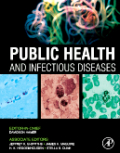
Public health and infectious diseases
Griffiths, Jeffrey
Maguire, James H.
Heggenhougen, Kristian
Quah, Stella R.
Emerging infectious diseases may be defined as diseases being caused by pathogens only recently recognized to exist. This group of diseases is important globally, and the experience of the last 30 years suggests that new emerging diseases are likely to bedevil us. As the global climate changes, so changes the environment which can support not only the pathogens, but also their vectors of transmission. This expands the exposure and effects of infectious disease and therefore, the importance of widespread understanding of the relationship between public health and infectious disease. This work brings together chapterswhich explain reasons for the emergence of these infectious diseases. These include the ecological context of human interactions with other humans, with animals which may host human pathogens, and with a changing agricultural and industrial environment, increasing resistance to antimicrobials, the ubiquity of global travel, and international commerce. Features the latest discoveries related to influenza with a newly published article by Davidson Hamer and Jean van Seventer* Provides a listing of diseases which were rare which have become resurgent or spread their geographic distribution are 're-emergent'* Highlightsdengue and malaria, as well as agents such as West Nile and other arbovirus that have spread to new continents causing widespread concerns* Includes discussions of climate influencing the spread of infectious disease, political and societal aspects
- ISBN: 978-0-12-381506-4
- Editorial: Elsevier Science
- Encuadernacion: Cartoné
- Páginas: 512
- Fecha Publicación: 06/05/2010
- Nº Volúmenes: 1
- Idioma: Inglés
